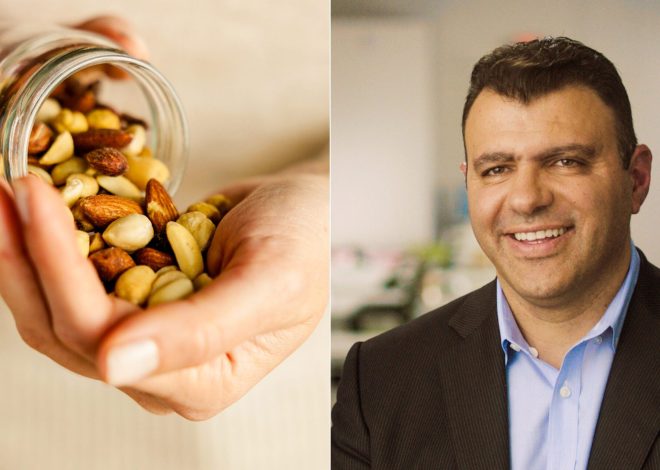
Good for health and the environment: The benefits of a plant-based diet
Good for health and the environment: The benefits of a plant-based diet

Many families are increasingly adopting a flexitarian diet.
Nutritionist explains
Awareness of a balanced and sustainable diet has increased significantly in recent years – and is more relevant than ever. Healthy, varied food is not only good for your own health, but also for the health of our planet. The German Nutrition Society (DGE) has also taken this into account and recently adapted its official nutritional recommendations accordingly.
Nutritionist Kristin Meyer tries to combine the topics of health and sustainability in her consultations. The Hamburg native uses her expertise to support Deli Reform’s awareness campaign on the topic of flexitarianism. In an interview, she explains how you can gradually incorporate more plant-based foods into your daily diet, why a plant-based diet does not necessarily mean giving up, and how you can stay full even if you are a “herbivore.”
Kristin Meyer: For me, healthy eating means providing the body with energy, building materials and protective factors, achieving a balanced ratio of nutrients and at the same time maintaining a healthy relationship with our planet. Plant-based foods play an important role in this, while animal and heavily processed products should be reduced.
But enjoyment also plays a role in healthy eating: people who have been carelessly consuming highly processed foods for a long time hardly taste the delicate flavors of natural foods and often think that whole foods are not enjoyable. Those who take the time to prepare and taste natural foods well will notice how their senses and taste change over time.
Meyer: Everyone should set their own goals and make gradual changes. Someone who only eats one portion of vegetables a day might first focus on increasing to two portions over two weeks. Someone who eats meat every day could decide to choose a plant-based protein alternative twice a week, such as a lentil burger or Bolognese made from soy granules. The taste will adapt over time if we don’t force ourselves.
Many people start with spreads and replace butter, sausage or cheese with plant-based alternatives. My recommendation: Replace butter with high-quality margarine with a high proportion of unsaturated fatty acids. Instead of cheese and sausage, choose plant-based spreads made from pulses, vegetables or seasoned tofu. However, a little caution is required here, as many of the products are heavily processed; sausage alternatives in particular often contain many additives and saturated fatty acids.
Meyer: It reduces the risk of diabetes mellitus and coronary heart disease, has an anti-inflammatory effect on the entire system and has a positive influence on intestinal health.
It also conserves our planet’s resources much better than a diet based on animal products. Factory farming is responsible for around 15 percent of greenhouse gases worldwide. To produce one kilo of animal protein, two to 20 kilos of plant protein are needed, depending on the animal and the product. This creates a large demand for agricultural land, which is then no longer available for healthy ecosystems. This reduces biodiversity.
Meyer: Fresh foods that have grown as naturally as possible on healthy soil have a positive effect on health and the intestinal microbiome. On the other hand, goods that have been stored for a long time, traveled long distances, or grown on depleted soil or in greenhouses have fewer secondary plant substances.
Good quality also plays a major role in oils and fats. Incorrect processing, storage or packaging can lead to harmful compounds forming through oxidation. Products of poor quality can taste rancid or bland.
Products with a high nutritional quality are those with a lot of unsaturated fatty acids, especially a high content of omega-3 fatty acids. Cold-pressed oils provide more nutrients and secondary plant substances, but are only suitable for heating to a limited extent. High-quality products contain vegetable oils. Suppliers such as Deli Reform have been relying primarily on rapeseed oil for decades.
Meyer: I keep meeting people who tell me that they grew up in rural areas with a diet that is so difficult to implement today: they only had meat once a week. Instead, they ate a lot of homemade food, regional vegetables, home-fermented foods, beans, and so on. So it’s not really that much of an innovation, but more of a “back to the roots”.
If you force yourself to do something, you will tend to overcompensate later. That’s why I recommend starting the change slowly and expanding your diet to include plant-based foods. If you experiment, sooner or later you will discover exciting dishes without meat and automatically become a flexitarian.
Meyer: This doesn’t just apply to people who eat a plant-based diet: Even those who eat animal products should think about what their body needs to stay healthy in the long term. But vegans should also think about what they need and in what quantities. It’s not enough to just leave out animal products. People who don’t eat meat or dairy products often consume too little protein and too many carbohydrates. If you get into the habit of eating a quarter of protein-rich foods such as pulses, tofu, soy granules, seeds and nuts at every meal, you’ll be well supplied. Carbohydrate sources such as grains and the like also contain protein.
Other critical nutrients are vitamin B12, iron, calcium, iodine, omega-3 fatty acids, zinc, selenium and vitamin B2. If you regularly eat various pulses, seeds, nuts and whole grain products as well as lots of fresh vegetables, you will meet your needs for almost all vitamins and minerals. You can get omega-3 fatty acids from linseed oil, rapeseed oil, walnut oil, olive oil or spreads that contain them every day. But be careful: these oils are very sensitive to heat. It is best to add them to food after cooking/steaming. If you eat something rich in vitamin C with your meal, you will optimise your iron absorption. To ensure you get enough iodine, I recommend using iodised salt and adding algae once a week.
Vitamin B12 is not found in plant-based foods, as it is only produced by microbes. This should be supplemented regularly. The same goes for vitamin D, which the body only produces when exposed to UV radiation. In winter, I recommend supplementing this.
Meyer: A balanced and filling meal consists of a quarter complex carbohydrates, a quarter proteins, half fruit and vegetables, and one to two tablespoons of healthy oils or fats. If you eat a meal that is low in fat or protein, you will only feel full later and consume too many carbohydrates. The body can sense via receptors whether all the macronutrients it needs have arrived. Fats and proteins prolong the time a meal stays in the stomach and ensure that carbohydrates are absorbed into the blood more slowly. This means there are no fluctuations in blood sugar, but a consistent, good supply.
spot on news

Ethel Purdy – Medical Blogger & Pharmacist
Bridging the world of wellness and science, Ethel Purdy is a professional voice in healthcare with a passion for sharing knowledge. At 36, she stands at the confluence of medical expertise and the written word, holding a pharmacy degree acquired under the rigorous education systems of Germany and Estonia.
Her pursuit of medicine was fueled by a desire to understand the intricacies of human health and to contribute to the community’s understanding of it. Transitioning seamlessly into the realm of blogging, Ethel has found a platform to demystify complex medical concepts for the everyday reader.
Ethel’s commitment to the world of medicine extends beyond her professional life into a personal commitment to health and wellness. Her hobbies reflect this dedication, often involving research on the latest medical advances, participating in wellness communities, and exploring the vast and varied dimensions of health.
Join Ethel as she distills her pharmaceutical knowledge into accessible wisdom, fostering an environment where science meets lifestyle and everyone is invited to learn. Whether you’re looking for insights into the latest health trends or trustworthy medical advice, Ethel’s blog is your gateway to the nexus of healthcare and daily living.



